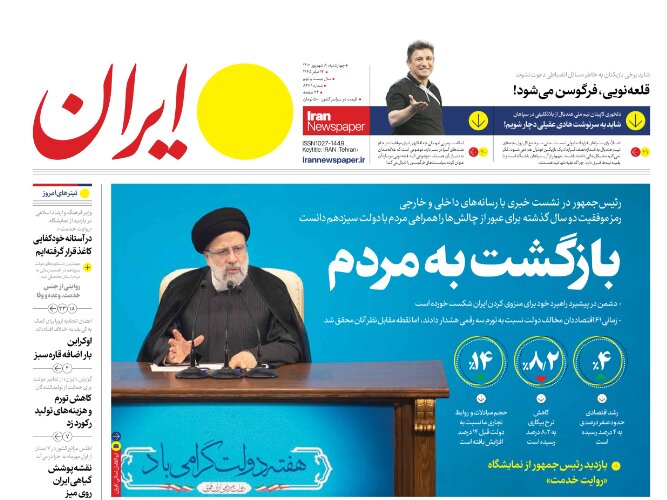TEHRAN PAPERS

In a conversation with Abolfazl Zohrevand, an expert on international issues, the Iran newspaper discussed the new process of negotiations and wrote: The result of the U.S. government’s failures against Iran caused them to start a new round of negotiations in Oman.
Moreover, this form of dialogue practically shows that the American authorities prefer to abandon the JCPOA negotiations to avoid the consequences that were ahead, especially in the domestic scene of the country. But they also seek to influence Iran’s relations with China and Russia, and they are worried about the consequences of recent developments in Iran’s relations with Arab countries, and the growing relations with Eastern powers. In order to prevent the situation from getting worse, they had no choice but to give concessions to Iran to encourage it to negotiate.
Iranian officials, who have the upper hand, especially in the current situation, can use the opportunity in the United Nations General Assembly to neutralize the pressures and wrong addresses by the West. Institutions related to foreign policy should pay attention to a list of important and strategic issues so that Mr. Raisi can put the country’s demands at the center of the world’s attention by maneuvering them.
Shargh: Rafael Grossi’s JCPOA signal to Iran!
Shargh wrote in a note: The International Atomic Energy Agency is trying to set an agenda for the Biden government to strike an agreement with Iran. In the first step, the IAEA tries to slow down Iran’s enrichment within a certain period. Rafael Grossi claimed at the Stockholm meeting on Monday that America was looking for a more comprehensive and long-term agreement with the Islamic Republic of Iran from the beginning. In view of the recent negotiations between Iran and the United States, Ghodsipour, an analyst on international affairs, believes that as the quarterly report of the IAEA Board of Governors on Iran’s nuclear activities is approaching, the remarks by Rafael Grossi suggest that the IAEA is willing to facilitate an agreement between Tehran and Washington. In fact, Grossi’s JCPOA signal is intended to broker an agreement or understanding between Tehran and Washington, so that both the United States and the Joe Biden administration can achieve a political and diplomatic victory on the eve of the 2024 presidential election. The IAEA, in the event of a possible understanding between the two sides, seeks to create better conditions to increase its monitoring of Iran’s nuclear facilities and activities, or at least secure a guarantee that the enrichment will not increase more than 60% in Iran’s nuclear facilities.
Hamshahri: Tehran-Baghdad security agreement
In a commentary, Hamshahri discussed the Tehran-Baghdad agreement on disarming separatist terrorist elements in northern Iraqi Kurdistan. The paper wrote: After the Islamic Revolutionary Guard Corps’ warning and attack on the positions of Kurdish separatist groups in the Kurdistan region of Iraq, the National Security Council of Iraq took measures to secure borders with Iran and Turkey and prevent the deployment of Kurdish groups in these areas. Therefore, the security agreement was made with the Islamic Republic of Iran, according to which Baghdad will not allow Kurdish separatist and terrorist groups to enter Iran’s territory by deploying border guards. Husham al-Rikabi, advisor to the Prime Minister, told the official Iraqi News Agency (INA): “This security agreement has three parts, which will include preventing infiltration of armed people after deploying border guards, handing over wanted people after issuing arrest orders according to the law, and disarming terrorist groups and removing camps.”
Kayhan: Censorship of the opening of the most important phase of South Pars
In an explanation, Kayhan addressed the censorship of the news on opening the most important South Pars phase by the media affiliated with the reform movement. It said: The reformist claimants who play an “infantry role” for the hostile actions of the West against the Islamic system, including disintegration, sanctions, division, terror, etc., remain adamant in its anti-national performance in favor of the enemy by censoring the inauguration of the 11th phase of the South Pars gas field, which truly exemplified the failure of the “maximum pressure” and the crippling sanctions. The reform faction is trying to hide the government’s achievements without the JCPOA and FATF.

No comments:
Post a Comment